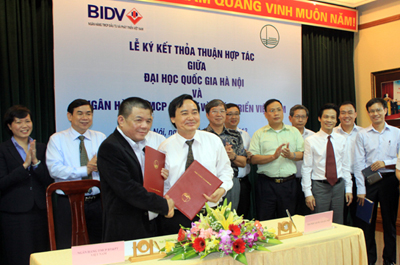
The signing MOU between VNU and BIDV, 8/2013
Vietnam National University, Hanoi, endowed with the mission of training highly qualified workforce and conducting top quality research, has gained not only trust but also cooperation with numerous provinces, institutions and business partners. During the period between 2000 and 2010, VNU has promoted collaborative scientific research activities in order to help provinces, sectors and ministries fulfill their tasks, provide scientific bases for socio-economic, cultural and educational development and environment protection, which are the key scientific and technological assignments of VNU.
VNU is the champion to successfully carry out Resolution 2 of the Central Committee of the 8th Session ensuring the business-university relationship and interactions, linking theoretical study with practical production”. VNU has identified that the tripartite university-institute-industry partnership is both the means and the end of the development of each partner and the general evolution of Vietnam science, technology and higher education. VNU has signed cooperation agreements with the Ministry of Natural Resources and Environment, Vietnam Oil and Gas Group, Association of Vietnam Business Executives, Vietnam National University in Ho Chi Minh City, Vietnam Academy of Social Sciences, Vietnam Academy of Science and Technology, Institute of Military Science, Viettel Group, Hoa Lac High-Tech Park, etc. VNU has applied and effectively operated the model of “collaborative faculty” and “collaborative laboratory” with various professional research institutions such as the Institute of Information Technology, Institute of Physics-Electronics, Institute of Material Science, Institute of Space Technology, Institute of Mechanics, etc. under Vietnam Academy of Science; the Center for Military Science and Technology under Ministry of Defence, Institute of Machinery and Industrial Instruments under the Ministry of Industry and Trade in order to offer training programs in cutting-edge science and technology. Such tripartite partnership is strategic in nature which helps avoid duplication, overlapping in investment while maintaining necessity and long-lasting mutual support.
Apart from training, the partnership has enabled VNU scholars and institutes to successfully win collective research grants, such as the on-going 5 State-level research projects, 3 joint research projects, including the research “Study to manufacture momentum navigating system in service of controlled flying devices” in collaboration with the Center for Military Science and Technology under Ministry of Defence which has been awarded with the Third Prize of Vietnam Talents 2008.
VNU has also signed a comprehensive cooperation agreement with Quang Ninh province, in which cooperation in science and technology plays the core role. Similarly, in 2011, another comprehensive cooperation agreement is signed with Ha Giang province, and a conference calling for investment is co-organized by both parties under the title “For Development of Ha Giang”. VNU and its constituents have also been directly involved in collaborative research to serve local socio-economic development and environment protection, and their results are highly appreciated for their effectiveness and applicability in such provinces as Ha Noi, Thai Binh, Quang Binh, Quang Tri, Thua Thien – Hue, Quang Ngai, etc. In Hanoi particularly, successful research should include such topics as “Co Loa Geo-record” conducted by the Institute of Vietnamese Studies and Development Science and various others investigating the economy, society, culture, diplomacy and history of the capital (under Focal Program KX.09), which contribute to the preservation of the famous Ancient Royal Citadel, one UNESCO-recognized World’s Cultural Heritage.
Specially, in February 2009, VNU signed an agreement of comprehensive cooperation with the Ministry of Natural Resources and Environment in research and graduate training on fields related to the exploitation and effective use of natural resources for the country’s industrialization and modernization, environment protection, sustainable development, mitigation of negative impacts, development of optimal adaptation modality to global climate change, etc.
In the cooperation between the two national universities – VNU and the other in Ho Chi Minh City, both have identified core areas for their scientific and technological cooperation, including:
- joint utilization of their scientific and technological resources: scholars, scientists, facilities, laboratories, equipment, etc.
- development and implementation of projects of mutual concern;
- delivery of graduate training in close connection with research;
- co-organization of national and international conferences;
- management of scientific and technological activities, sharing information and experience, etc.
- joint implementation of research projects under State Programs, e.g. “Development of the South of Vietnam”, State-level project “Developing models for State organization and management of cities directly under the Government” coded KX02-03/06-10 hosted by the Institute of Vietnamese Studies and Development Science.
- cooperation in Nano Science and Technology is mostly conducted by VNU University of Technology and Laboratory of Nano Technology LNT of Ho Chi Minh City National University (HCMC NU), who also co-organized the International Workshop on Nano Technology and Applications, or VNU University of Technology and HCMC NU Center for Microcircuit Design Research and Training with the project “Research, design and pilot manufacture of video signal coding device applied in new generations of multimedia equipment.”
In addition, hundreds of other research projects are being conducted by VNU constituents, faculties, institutes, centers in science and technology, social sciences and humanities, etc., which make direct contribution to the solutions of current socio-economic and cultural issues of the country’s development.